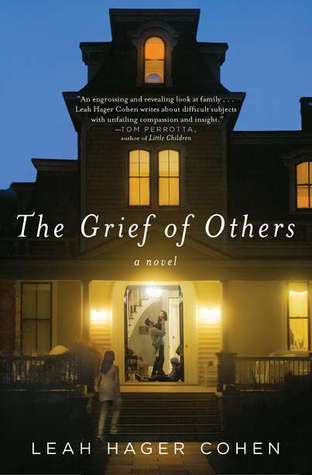 Synopsis:
Synopsis:
One year ago, the Ryrie family suffered an unspeakable loss. The child Ricky was carrying was determined to have anencephaly early in the pregnancy. Simon Isaac Ryrie lived just fifty-seven short hours. He was quietly cremated, and John placed the small cardboard box containing his remains deep in the back of their bedroom closet, hidden from sight. There was no funeral. Now Paul, age thirteen, has entered seventh grade and found himself the target of bullying. Even the students who were his friends and invited him to birthday parties in sixth grade now shun him in the face of the constant barrage of humiliating taunting. Baptiste is his only friend. Meanwhile, Biscuit, who is three years younger, has become obsessed with funeral rituals practiced in various countries around the world. She stole a book on the subject from the school library and keeps it hidden under her bed. She has also developed a truancy problem with which neither Ricky nor John seem able to confront.
Biscuit cuts class and heads to the Hudson River, determined to carry out one such ritual, equipped with an egg and some ashes from the fireplace. There, she encounters Gordie Joiner, a nineteen-year-old young man who lost his father to lung cancer a few months earlier. His dog, Ebie, accidentally knocks Biscuit into the river while she is in the midst of the ceremony she has come to perform. Gordie rescues her and insists upon driving her home.
When they arrive, they find John has come home early from the local community college where he is the technical director for the drama department. Jess, John’s daughter from a brief college relationship, has arrived from California. This is only the second time Biscuit has met Jess. Some eight years earlier, Jess wanted to get to know the father she had never met, so she spent two weeks with the family at their summer cabin. Now she has arrived unexpectedly with some very big news and an uncertain future.
Review:

The children, Paul and Biscuit, are each in pain and acting out. John and Ricky have always been good parents and their love for the children is never in question. But they are so absorbed in their own emotional response to Simon’s loss and the problems in their own relationship to recognize, much less confront, the tragedy’s impact on their two older children. Biscuit wonders why the baby is never mentioned, what happened to his body. She is in need of explanations and closure as evidenced by her fascination with death rituals and determination to carry one of them out in secret, no matter the risks. Paul, meanwhile, has retreated into his room where he sketches violent scenes and battles, desperately trying to cope with the fact that he has lost the friends he once had and must endure the hurtful jabs and digs hurled at him daily by cruel classmates. He questions what has happened to him, how he arrived at this point in his life, and ponders his future . . . or if he even has a future.
Ricky has, as John pointedly reminds her, not come home from work early in the year that has passed since Simon’s death. She remains isolated in her Manhattan office, traversing home across the Hudson River each evening with thoughts of what it would be like to run her car off the side of the bridge into the icy depths of the water below. She is wracked with sorrow and guilt about the fact that she betrayed John because she did not trust him. The baby was conceived after they came together following a long period without intimacy. Since his birth and short time with them, they have again been distant from each other.
For John’s part, his hurt and resentment resides just below the surface and threatens to spill out as he strives to keep his family life on a normal course. Because his workplace is closer to home, many of the responsibilities for Paul and Biscuit fall to him — when Biscuit is again missing from school, for instance, Ricky calls and insists that he leave work to head home and look for her. He loves Ricky, but has lost trust in her, just as she lost faith in him, leaving him unable to respond to her attempts to rekindle their physical intimacy. In addition to all that is currently happening to his family, he lives with the pain of having lost Jess when she was born. Her mother insisted that she would raise the child alone and allowed John to hold the newborn just once in the hospital. He had no further contact or relationship with Jess until she was fifteen, and insisted upon meeting and getting to know her birth father. Now, eight years later, she has returned unexpectedly and with startling news. John worries about her future, as well as his family’s ability to integrate her into their lives.
The story alternates between the present day, one year earlier when the baby was born and died shortly thereafter, as well as eight years earlier when Jess joined them for a family vacation at their cabin. During each time period, author Leah Hagen Cohen explores in detail both the family dynamics and each individual member’s emotions and experiences. The result is a fascinating, if sometimes difficult to read, exploration of the ways in which unacknowledged and unexplored grief has permeated the Ryries’ lives, impacting them in ways that are readily visible to her readers as they watch the family members from afar.
Cohen’s descriptive, evocative prose is searingly revealing without ever becoming cloying or maudlin. Each character is carefully and tenderly examined, giving readers an understanding of why each has reacted to their shared tragedy and fellow family members in their own unique manner. As John and Ricky’s future hangs in the balance, readers will find themselves unable to put the book down, eager to see if they can weather the crisis and keep their family together. Equally important is the question of whether any of them can find relief from their intense emotional reaction to loss and, over time, recover from its devastating impact upon them both individually and as a cohesive family unit. Cohen has bravely and successfully tackled complex, difficult issues, daring to ask questions through her characters’ journeys to which there are no easy answers. The result is a fascinating and memorable study of one family about whom readers will come to care deeply and for whom they will wish only the best.



3 Comments
I read a book recently about a loss of a family member and it dealt with each person and their grief, they each suffered alone and it hurt my heart to read. Thanks for the review, I must admit I prefer light happy reads. Lisa bookhimdanno.blogpsot.com
Pingback: Leah Hager Cohen, author of The Grief of Others, on tour September/October 2011 | TLC Book Tours
It is amazing how people in the same family can react to tragedy in such different ways – that’s something I’ve experienced in my own family.
This sounds like an amazing read. Thanks for being on the tour.